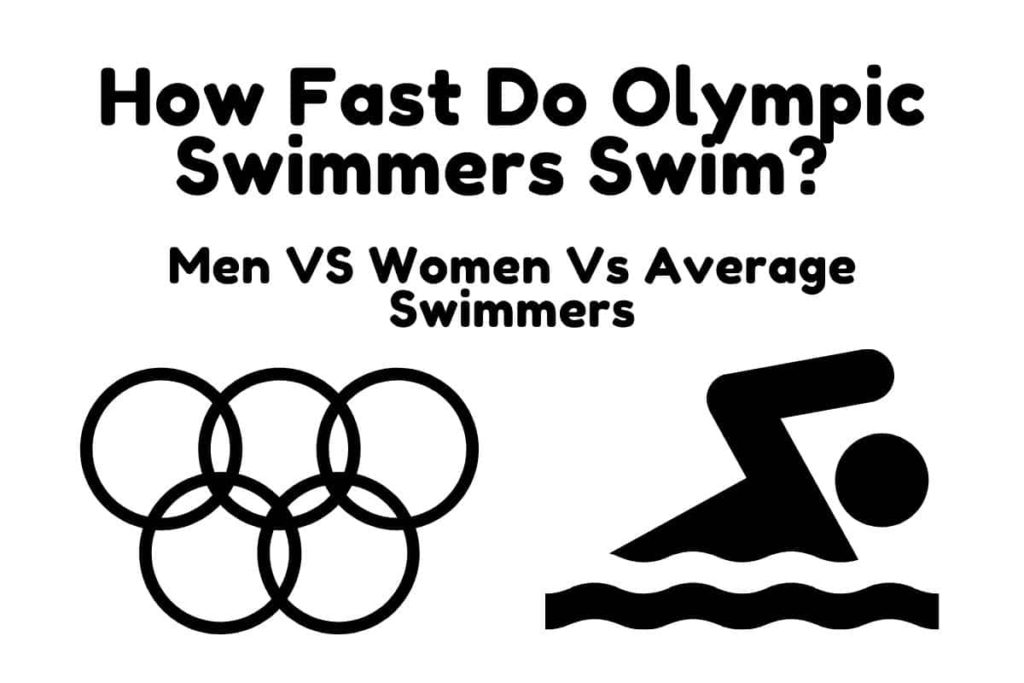Swimming is one of the sports that comes to life in the Olympics. People who have not been anywhere near a pool for years suddenly have well-informed opinions on the rise of Chinese swimming, or will tell you for sure who is going to be in the running for gold for the women’s 100m butterfly.
Given that it is one of only four sports that have been present ever since the inaugural modern Olympics in 1896, it is no surprise that Olympic swimming captures the public’s imagination.
So How Fast Do Olympic Swimmers Swim ? For short distance races, Caeleb Dressel (USA) holds the men’s 100m record at 47.02s from the Tokyo 2020 games. Emma McKeon (Australia) holds the female record at 51.96s, also from Tokyo 2020. At the other end of the spectrum the record for the 10km marathon swim is held by Ferry Weertman (Netherlands) at 1:52:59.8, this is an average pace of around 1:08 per 100m.

How Fast Do Olympic Swimmers Swim By Stroke? Men Vs Women
The fastest stroke is freestyle, followed closely by butterfly then backstroke, and finally breaststroke. We have broken down the average swim times by event, and added the average 100m pace so that you can see just what pace these elite swimmers are able to hold over distances.
| Men | 50m | 100m | 200m | Avg pace /100m | 400m | Avg pace /100m | 800m | Avg pace /100m | 1500m | Avg pace /100m | 10km | Avg pace /100m |
| Freestyle | 21:07 | 47:02 | 1:42:96 | 51:48 | 3:40:14 | 55:04 | 7:41:26 | 57:41 | 14:31:02 | 58:04 | 1:52:59:80 | 1:08:00 |
| Butterfly | 49:45 | 1:51:25 | 55:42 | |||||||||
| Backstroke | 51:85 | 1:53:27 | 56:44 | |||||||||
| Breaststroke | 57:13 | 2:06:38 | 1:03:19 | |||||||||
| Women | Avg pace /100m | |||||||||||
| Freestyle | 23:81 | 51:96 | 1:53:50 | 56:55 | 3:56:46 | 59:12 | 8:04:79 | 1:00:40 | 15:35:35 | 1:02:22 | 1:56:32:00 | 1:10:00 |
| Butterfly | 55:48 | 2:03:86 | 1:01:34 | |||||||||
| Backstroke | 57:47 | 2:04:06 | 1:02:03 | |||||||||
| Breaststroke | 1:04:82 | 2:18:95 | 1:09:48 |
Data taken from: https://olympics.com
Olympic swimmers specialize in either short, middle, or long-distance swimming. This is shown by the fact that the world records for the men’s 50m and 100m are both held by Caeleb Dressel from the USA, and the 400m and 1500m freestyle are both held by China’s Yang Sun.
Another interesting point is when we look at the difference between the time differences between the male and female times. The biggest percentage difference in times is over the short distance events. This is unsurprising given that these events rely heavily on explosive power. In particular Olympic record time for the 100m butterfly is over 6 seconds slower for the women’s time against the men’s; this is around a 10% difference in time.
Once we get to the 10km event, known as marathon swimming, that difference in times between men and women reduces drastically to less than 3%. It seems that once we get to marathon swimming, the increase in reliance on technique over power levels the playing field across genders.
How Much Faster Have Swimmers Become Over Time?
Olympic records are tough to beat. So much so that even when the cream of the world’s swimmers gather every four years, there is no guarantee that you will see records broken across the board. In fact, in Atlanta in 1996 and Rio 2016 not a single men’s record for the major events was broken.
Take a look at the table below where we have collected the data on men’s freestyle swimming from the last 10 Olympic games:
| Olympics Event | 100m | 200m | 400m | 1500m |
|---|---|---|---|---|
| LA 1984 | 49:80 | 01:47:44 | 03:51:23 | 15:05:20 |
| Seoul 1988 | 48:63 | 01:47:25 | 03:46:95 | 15:00:40 |
| Barcelona 1992 | 49:02 | 01:46:70 | 03:45:00 | 14:43:48 |
| Atlanta 1996 | 48:74 | 01:47:63 | 03:47:97 | 14:56:40 |
| Sydney 2000 | 48:30 | 01:45:35 | 03:40:59 | 14:48:33 |
| Athens 2004 | 48:17 | 01:44:71 | 03:43:10 | 14:43:40 |
| Beijing 2008 | 47:21 | 01:42:96 | 03:41:86 | 14:40:84 |
| London 2012 | 47:52 | 01:43:14 | 03:40:14 | 14:31:02 |
| Rio 2016 | 47:58 | 01:44:65 | 03:41:55 | 14:34:57 |
| Tokyo 2020 | 47:02 | 01:44:22 | 03:43:36 | 14:39:65 |
Seoul 1988 saw some incredible times, as the records were smashed in all the major men’s events. Notably over 4 seconds was taken off the 400m time by George Dicarlo of the USA.
The most competitive distance by far is the 200m which has seen only just over 4 seconds shaved off the time set in 1984. That record was set by Michael Phelps back in 2008 in Beijing and nobody has been able to even close to that time since.
Why Are Olympic Swimmers Becoming Faster Over Time?
Although we do not see records tumbling at every Olympic Games, it is clear that swimmers are getting faster over time. There are multiple factors that go into explaining where these gains are coming from, and some are somewhat controversial.
The 2008 Olympics is one that will stand out in all swimming fans minds as the most controversial as Speedo introduced the LZR Racer suit, 94% of the races won in those games were done so wearing the LZR Racer (source). It was so effective that by 2010 all high-tech swimsuits were banned from competitions.
- One reason for faster times may be down to the pools themselves. Although FINA regulations are that Olympic pools should be a minimum of 2 meters deep, after 2008 they set the recommendation at 3 meters. The deeper pools reduce turbulence for the swimmers because it takes longer for the disturbed water to bounce back off the bottom of the pool. This allows swimmers to glide more smoothly through the water, and is why you may hear about certain pools being ‘fast pools’. You can read more about this in our article ‘How many gallons and litres are in an Olympic Pool?’
- Money is certainly a factor. Ambrose ‘Rowdy’ Gaines won the gold medal for 100m freestyle back in LA in 1984 and he states that in 1984 you could not make a living from swimming. When you compare that to today’s champion, Caeleb Dressel has a net worth of $5 million (source). That amount of money means that you can focus purely on your sport without the distractions of money worries. It also means that you can have the best training equipment, nutrition experts and trainers at your side to help you improve.
- Finally, technology has played a part in the way that swimmers train. Underwater video technology allows swimmers to analyze every part of their stroke in order to get the maximum performance from the athlete. Being able to analyze things like VO2 max has meant that training regimes have become more focused on getting swimmers to become more efficient and, therefore, faster. For more on this, check out our post on Endless Pools: Are They Worth It ?! Pros, Cons, Sizes, Speeds, Cost & Alternatives!
How Fast Does An Average Swimmer Swim?
When comparing Olympic swimmers to the average swimmer, the stats are mind-boggling.
The idea of an ‘average’ swimmer is rather misleading because there are quite a few factors that make like-for-like comparisons irrelevant. We have seen that gender plays a massive role when looking at professional swimmers, with male swimmers being significantly faster over shorter distances.
Another major factor would be age. Take a read of our article on ‘Triathlon Distances & Average Timings Analysis (Infographic)’ and you will see that, across all triathlon distances, younger swimmers come out victorious. To highlight this further, the average age of
On average, Olympic swimmers are 23.3 years old (source), so you need to compare yourself against people of a similar age to get an idea of an average.
With that said, here are the ‘average’ times for one mile (1.6km) without taking into account age or gender:
| Beginner | 40 – 50 mins |
| Intermediate | 30 – 35 mins |
| Advanced | 25 mins or less |
Data taken from swimcompetitive.com
If we take the average swim speed to be 2mph (source), then this is how the average swimmer would fair against the current Olympic records:
| 100m | 200m | 400m | 1500m | |
| Olympic Records | 47:02 | 01:42:96 | 03:40:14 | 14:31:02 |
| Average Swimmer pace | 01:51 | 03:42:00 | 07:24:00 | 27:58:00 |
As you can see, Olympic swimmers are more than twice as fast as the ‘average’ swimmer, the only exception for the 1500m. We can expect this to be the case as there is less of a differential in pure power for medium distance swimmers versus the average swimmer when compared to sprinters. Even so, the Olympic record for the 1500m is still close to 50% of the time we can expect from an average swimmer.
In short, if you want to compete at the top level then you really have to be an exceptional swimmer to even stand a chance.
Also, find out How Far Can the Average Person Swim? 1 mile, 10 miles, 30 min & Underwater ?!
How Fast Do Olympic Swimmers Swim When Compared To Sharks And Penguins?

Although it is highly unlikely to find Caeleb Dressel going up against an aquatic animal, the hypothetical question is an interesting one to compare the best of the human race against what nature has to offer.
Dressel (Olympic Swimmer) is fastest at the very start of the 50m freestyle which is the dive and the underwater kick section. In this part of the race he is able to reach a top speed of just over 6.7 miles per hour.
The fastest shark is the Shortfin Mako shark, which are found throughout the globe as they travel long oceanic distances in search of prey. Very seldom have they ever been known to attack humans as their main source of prey is made up of mainly large bony fish and squid (source).
The Shortfin Mako shark has an astonishing top speed of 45 miles per hour (source). It is safe to say that even an Olympic swimmer would stand no chance against a Mako if we did happen to be on its diet.
Olympic Swimmers may stand a fighting chance against the ‘average’ penguin, as most swim between 4-7 mph. It would certainly be a close call over 50 meters. The fastest of all penguins, however, is the Gentoo penguin which can reach a top speed of 22 mph (source).
Final Thoughts
Olympic swimmers spend their entire lives training for an event that comes round just every four years. Nowadays the financial rewards for the very top swimmers mean that they can focus entirely on swimming and ensure that they have the best nutrition and training advice possible in order to peak at just the right time when the Olympic games come around.
One of the main reasons we watch the Olympic games is that we want to watch these athletes do the impossible. We want to watch them break records and inspire generations. We may not be able to emulate their times in the pool, but simply watching it, and sharing in their moment is pretty special in and of itself.
If you are interested in competitive swimming then check out or post on What Is a “heat” in Competitive Swimming? What You Need to Know!

